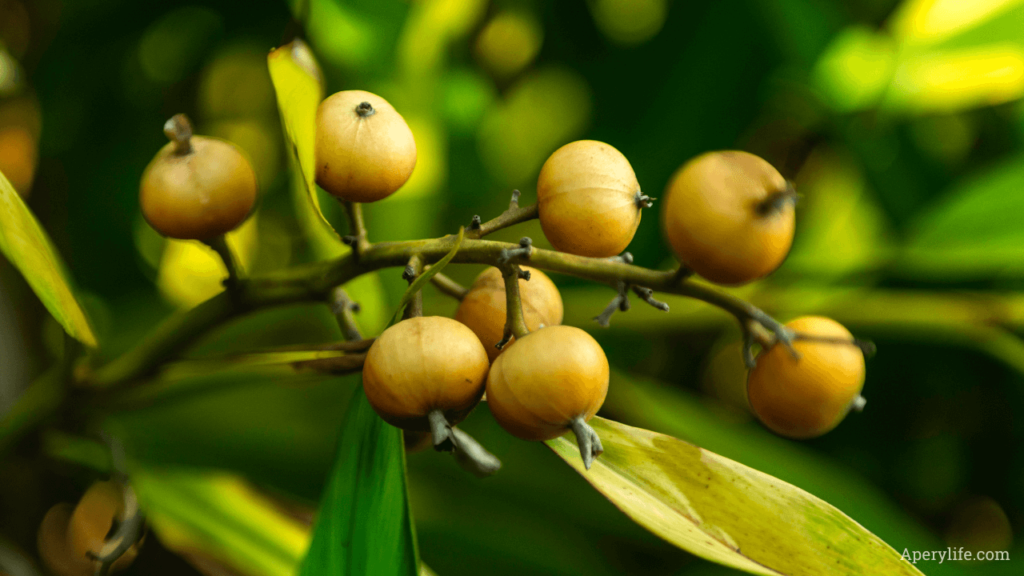Introduction
Nutmeg is a spice with intense and slightly sweet aromas, originating from the Moluccas in Indonesia. It has been valued for centuries in both cooking and traditional medicine, used to enhance both sweet and savory dishes with its unique and distinctive flavor. Nutmeg is also known for its health benefits, although it should be consumed in moderation to avoid side effects.
Characteristics of the Plant
Nutmeg comes from the seed of the Myristica fragrans tree, an evergreen that can grow up to 20 meters tall. The spice we know comes from the inner kernel of the fruit, which is dried and then grated to produce the powder used in cooking. The plant also yields another spice, called mace, which is obtained from the outer covering of the seed and has a similar but milder aroma.
Nutritional Properties and Health Benefits
Nutmeg is prized not only for its distinct flavor but also for the many benefits it offers:
- Antioxidant: Rich in antioxidant compounds like eugenol and safrole, nutmeg helps combat free radicals and protect cells from aging.
- Digestive Aid: Traditionally used to ease digestive issues, it can reduce bloating and stimulate appetite.
- Calming Effect: Nutmeg has relaxing properties that may help reduce anxiety and stress, promoting restful sleep.
- Antibacterial and Anti-inflammatory: Thanks to its essential oils, nutmeg acts as a natural antibacterial and may help reduce mild inflammation.
- Memory Booster: Some studies suggest its compounds may have beneficial effects on memory and cognitive function.
Culinary Uses
Nutmeg is an extremely versatile spice used in a variety of both sweet and savory preparations:

- Desserts and Sweets: Ideal for flavoring cakes, cookies, puddings, and creams, thanks to its warm and slightly spicy taste.
- Hot Beverages: Perfect in hot drinks like mulled wine, hot chocolate, or spiced teas.
- Savory Dishes: Excellent in mashed potatoes, soups, white sauces like béchamel, and meat dishes.
- Pasta and Rice: In small quantities, nutmeg enhances the flavor of pasta, rice, and gratinated vegetable dishes.
- Spice Blends: It is a key ingredient in many blends, such as garam masala and curry spices.
How to Grow Nutmeg
Growing nutmeg can be challenging as it requires a tropical climate and specific conditions:
- Climate and Position: Nutmeg thrives in warm, humid climates and requires indirect sunlight exposure.
- Soil: Prefers rich, well-drained soil. It’s important to avoid waterlogging, which can harm the roots.
- Watering: Nutmeg requires regular but moderate watering. The soil should stay moist but not overly wet.
- Growth Time: The plant takes several years before producing fruit (about 7–9 years), and a mature tree can bear fruit for around 60 years.
- Harvest: Fruits are picked when ripe and, once dried, the seed is extracted to produce the spice.

Interesting Facts about Nutmeg
- Ancient Usage: In the past, nutmeg was highly valuable, used as a trading commodity, and was a luxury reserved for the wealthy.
- Psychoactive Effects: When consumed in large quantities, nutmeg can have psychoactive effects, leading to hallucinations, nausea, and other issues. For this reason, it’s advisable to use it sparingly.
- Symbol of Good Luck: In past centuries, nutmeg was considered a symbol of good fortune and was often carried as a talisman.
Conclusion
Nutmeg is a precious and versatile spice, capable of enhancing dishes with a unique aroma and offering several health benefits. When used in moderation, it’s perfect for adding a rich aroma to dishes while providing antioxidant and digestive benefits.
Reproduction reserved © Copyright Aperylife.com